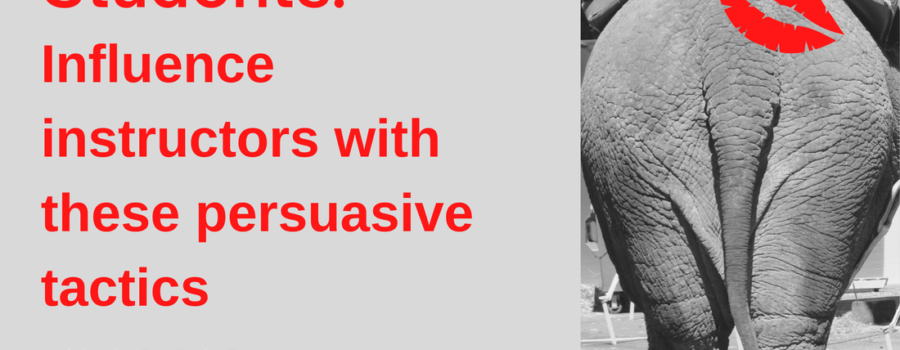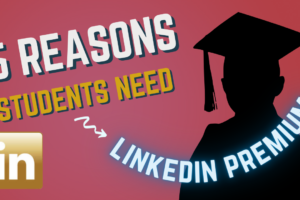The fall term is about to begin at colleges and universities. Take a moment to envision your professors submitting final grades at the end of the term. As they move down the list of students, they’re thinking about whether to upgrade a student’s grade from an A- to an A or another student’s grade from a C+ to a B. Because they don’t know anything about one student, they log the C+ as a C+. The student obviously did what was required but the professor only recognizes their name. They think: Who the hell is this learner?
However, you heeded the advice in this blog, you get bumped from a B+ to an A. How the hell did you influence your miserly professor in this way? The answer: Application of exchange relations theory, which is a fancy-pants understanding of the timeless art of interpersonal influence.
Many professors are egomaniacs. Focus on them and you focus on something they love. Themselves.
In this post, I want to share three strategies that I’ve used, and I know have been used effectively on me as an instructor: 1. Ask relevant opinion-soliciting questions, 2. Attend office hours at regular intervals and compliment while there, 3. Talk about common interests. Applying these strategies should positively frame a professor’s perception of you and influence their evaluation of your work during the term and at the end of the term. More importantly, you will build a relationship that could yield things like glowing reference letters, leads to jobs, and assistance in obtaining scholarships.
1. Ask relevant, opinion-seeking questions.
Many students will inundate faculty with assignment-related questions that can often be found by reading the assignment prompt. This gets aggravating. This means that if you avoid those types of questions and instead ask relevant questions that solicit your instructor’s expert opinion, then you’ll be doing what Richard Emerson describes as “status building.” In other words, you’ll be activating the ego of your instructor. The art of asking questions is simple: Signal respect, compliment, provide a scenario or context, ask for advice. Here’s an example:
Dr. Engstrom [respect], I loved today’s reading and your example on ‘X’ [compliment]. It got me thinking about a similar but slightly different situation … [scenario]. In your experience, how would you approach this situation [ask for advice]?
Change up the format by asking whether the reading would help, what other articles they’d recommend, and so on. Of course, if you do heed their advice, let them know that it worked–perhaps when you attend their office hours.
2. Attend Office Hours (+ Compliment)
Generic advice given to students is to sit at the front of the classroom. I think this tactic helps, but not like visiting office hours. Because so few students drop by faculty offices, when students do stop by it leaves faculty with a positive impression. Don’t just drop by and waste the instructor’s time. Have a purpose for the meeting. Good reasons to visit office hours are to clarify assignment guidelines, brainstorm ideas for projects, writing, or speaking assignments, discuss tricky concepts, or seek academic or career advice.
While you’re in the office, ask good questions (see the previous tip) and identify common interests (see next tip). Inventory the office and compliment: “Oh, wow, you’ve got an amazing library of books!”; “Is that your dog in the photo? What’s their name?”; “It looks like you travel a lot. Where was your favorite place to visit?”
Your questions and comments are information gathering, which can then be used to signal similarity.
Tip: Questions to Ask Professors During Office Hours | GCU Blog.
3. Talk About Common Interests
When engaging with your professor (or anyone for that matter), express commonality. People tend to be influenced by how likable someone is and we tend to like those who are like us.
When you express real interest in someone else’s activities and share how you also have an interest, you are engaging in an affinity-seeking communication tactic that builds common ground. When you share common ground with communication partners, you open them up to influence.
Don’t fake interest. Find something genuine to share. It might be that you love to read and learn. This is something faculty love to see in students. You might have a similar interest in pets or cuisine or travel or exercise.
When sharing interests, keep the focus on the faculty to stimulate their ego: What do you like to cook? Oh, me too. Do you have any cooking tips?
Professors are egomaniacs. Focus on them and you focus on something they love. Themselves.
Read: The affinity-seeking function of communication
Final Thoughts
Perhaps the scenario that started this post seems unfair. Should faculty “bump” a student’s grade? Well, we don’t live in a world of pure objectivity and faculty–just like you–are human. This means they can be influenced. Perhaps this is rationalization, but when I meet a student who asks relevant questions, visits me in office hours, and shares a few their personal interests with me, I want to reward this behavior. A little boost in the final grade is a way to reward. I believe interpersonal influence skills will serve them well as citizens and as leaders of an industry.
So what persuasive strategies or tactics have worked for you in the subtle art of kissing butt? Share them in the comments.
About Craig
Dr. Craig Engstrom is an associate professor of business communication at Southern Illinois University Carbondale and founder/chief consultant of Communication@Work LLC. Get more tips via YouTube >> https://youtube.com/craigengstrom





